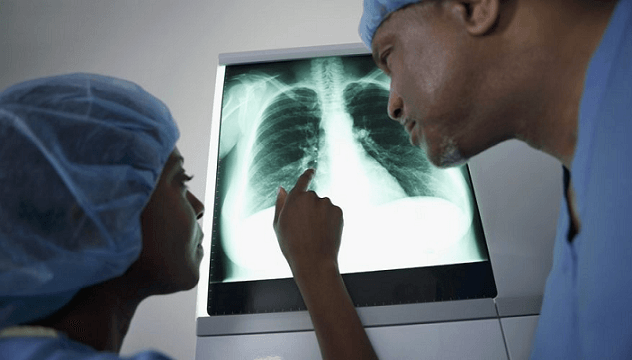While Radiography does not necessarily rate among the most coveted profession in the medical line, it stands right there among the most important. In the simplest of terms, a radiographer, also mostly known as a radiologic technologist, takes x- rays and makes use of other imaging equipment to get a clear image of a patient’s body parts.
Do you want to know how much radiographers earn in Nigeria? You are on the right page. In this article, we will take a look at how much Radiographers earn.
We will consider the average salaries of radiographers that work in government hospitals and teaching hospitals. We will also have a glance through how much they earn in the private sector.

Salaries of Radiographers in Nigeria
The pay range of any radiographer depends on the kind of job and job descriptions, years of experience in the field and qualification. Sometimes, the location of the job, whether it is a hospital or a laboratory, also affects the eventual salary the expert is paid. Specializing in a specific field including the CTs, MRIs, and other advanced techniques also attracts somewhat higher pay.
In terms of level and years of experience, some senior radiographers, especially those with specializations in core areas like Computer tomography, Magnetic Resonance Imaging (MRI) and other special procedures earn more in Government hospitals and Laboratories. Let us take a look at how much radiographers earn in various fields and areas of work, considering only the entry-level salaries as it stands today.
Radiographers in Government Hospitals
It is a known fact that experts in the government sectors are usually better paid compared to their colleagues in the private sector. As expected, radiographers that find themselves in Government-owned hospitals, whether Federal or State sector, are paid better than those in private hospitals and laboratories.
On average, radiographers earn between N100, 000 and N150, 000 for a start in a Federal setting and about N80, 000 – N120, 000 in State hospitals and laboratories. As the level and year of experience increases, there is a significant salary review to match the level.
Radiographers in the Private Sector
In most cases, there is a significant difference in the salary structure and scale between workers in the Government sector and the private sector. Here, the difference is also noticeable; one reason most experts prefer the Government sector. On average, radiographers in private hospitals and laboratory earn between N70, 000 and N100, 000 for a start. As the level and year of experience increases, there could be a significant salary review to match the level.
Pursuing a Career in Radiography
Radiographers are professionals who use complex imaging apparatus to x-ray several parts of the human body and assist a detailed diagnosis. They perform medical imaging actions to identify medical problems.
They are also largely responsible for getting patients ready for radiology examinations, positioning them correctly under the machines and to confirm accurate doses of radiation. They also maintain patient archives and radiographic apparatus.
They have a place in various medical sectors including clinics, hospitals, and diagnostic imaging centres and Laboratories. The medical radiography field is expected to significantly rise in the coming years. This is because there are a lot more reasons and diseases to diagnose in recent times and the need for radiographers has significantly increased. Radiography is assuming vital proportions in the diagnostic field.
A career in Radiography – Requirements for Admission
The importance of radiography has grown by the day and so is the field. Lots of people are looking into the profession and seeing amazing prospect in years to come. While radiography is still not among the most common fields in the medical sector, it has drawn attention of late and it is easy to see why people are beginning to flock into the field.
To initiate a career in radiography, the core requirement is to be a science student. You have to meet the basic requirement to study radiography is the university. This section takes a look at the basic requirement needed to pursue a career in Radiography.
For WASSCE
This is one of the most fundamental requirements. To pursue a career in radiography, you are expected to have a minimum of 5 credit passes in at least 5 of the core science subjects which include Mathematics, English Language, Physics, Chemistry, and Biology. Some universities require you to pass this in just one sitting which some give room for a combination of results for a maximum of two sittings.
For UTME/JAMB
The Joint Admission and Matriculation Board (JAMB) is the governing body charged with the responsibility of managing admissions into tertiary institutions in Nigeria. A student applying for the radiography course in Nigeria is expected to score a minimum of 200 in the UTME examination, although a few institutions now take 180.
However, scoring over 200 does not guarantee admission as you are subjected to internal screenings as well. A student applying to study radiography is expected to enroll English Language, Physics, Chemistry and Biology as the core course to take during the exam. It should be noted that although Mathematics is one of the core course students are expected to pass on the WAEC level, it is not a required subject to write on UTME level.
Universities that Offer Radiography in Nigeria
- University of Calabar
- University of Lagos
- University of Maiduguri
- Usman Danfodiyo University
- Nnamdi Azikiwe University, Awka
- University of Nigeria, Nsukka
- Bayero University, Kano.
Related Stuff
- Dentists’ Salary in Nigeria (2024): See What They Earn
- Pharmacists Salary in Nigeria (2024): See What They Earn
- Web Developers’ Salary in Nigeria (2024)
- Geologists’ Salary in Nigeria (2024)
- Mechanical Engineering Salary in Nigeria (2024)
- Chevron Nigeria Salary: See How Much They Pay in 2024?
- NNPC Salary Structure: How Much Does NNPC Pay? (2024)
- Biomedical Engineers’ Salary in Nigeria (2024)
- Anatomists’ Salary in Nigeria in 2024: See What They Earn
- Housemanship Salary in Nigeria (2024)
- How Much is the Nigerian Navy Salary? (April 2024)
- Civil Engineering Salary in Nigeria (2024): Full Details
- How Much Do Models Earn in Nigeria?
- Radiographers’ Salary in Nigeria (2024): See What They Earn
- Biochemists’ Salary in Nigeria (2024)
- How Much Does Uber Pay Car Owners in Nigeria? (2024)
- TV Presenters Salary in Nigeria (2024)
- KPMG Nigeria Salary: See How Much They Pay
- Medical Doctors’ Salaries in Nigeria (2024): See What They Earn
- Nurses Salary in Nigeria (2024): How Much Are They paid?
- Petroleum Engineering Salary in Nigeria (2024)
- Investment Bankers’ Salary in Nigeria (2024)
- Civil Engineers’ Salary in Nigeria (2024)
- How Much Do Taxify Drivers Make Weekly in Nigeria? (2024)
- How Much Does Bolt Charge per KM in Nigeria? [(year)]
- Microbiologists’ Salary in Nigeria (2024)
- Public Health Salary in Nigeria (2024): Is It Worth It?
- Senators’ Salary in Nigeria – (2024) Full Breakdown
- Geologist Salary in Nigeria (2024)
- Nigerian Pilot Salary: See How Much They Earn (2024)
- Salary of Optometrists in Nigeria (2024)
- Mass Communication Salary in Nigeria (2024)
- Level 8 Salary in Nigeria (2024): See How Much Is Paid




![How Much Does Bolt Charge per KM in Nigeria? [(year)] How Much Does Bolt Charge per KM in Nigeria? [(year)]](https://nigerianprice.com/wp-content/uploads/2021/11/How-Much-Does-Bolt-Charge-per-KM-in-Nigeria-211x150.jpg)
